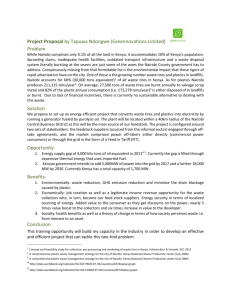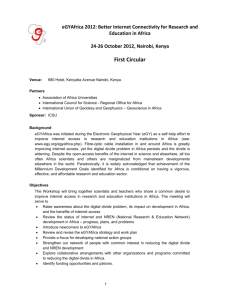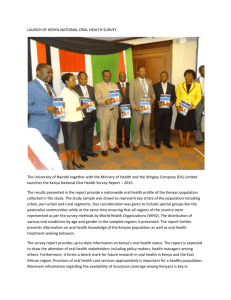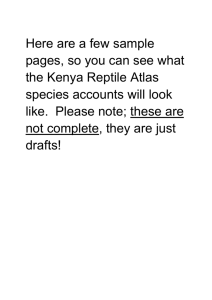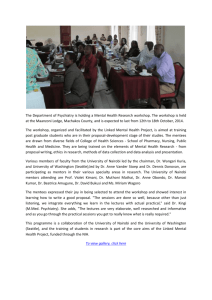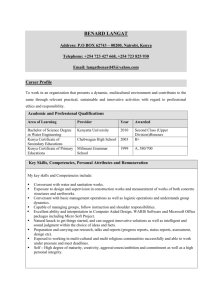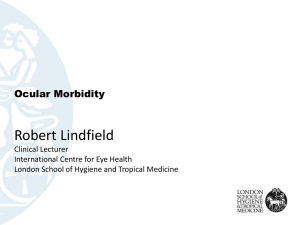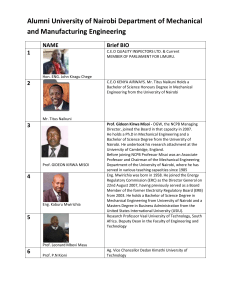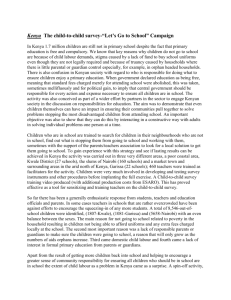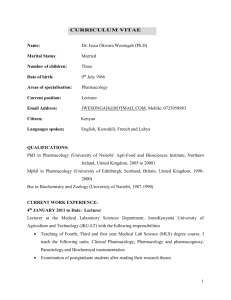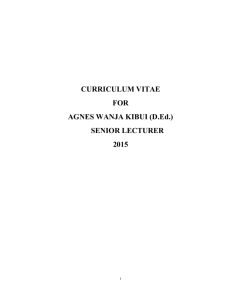Objectives for the Nairobi Process
advertisement
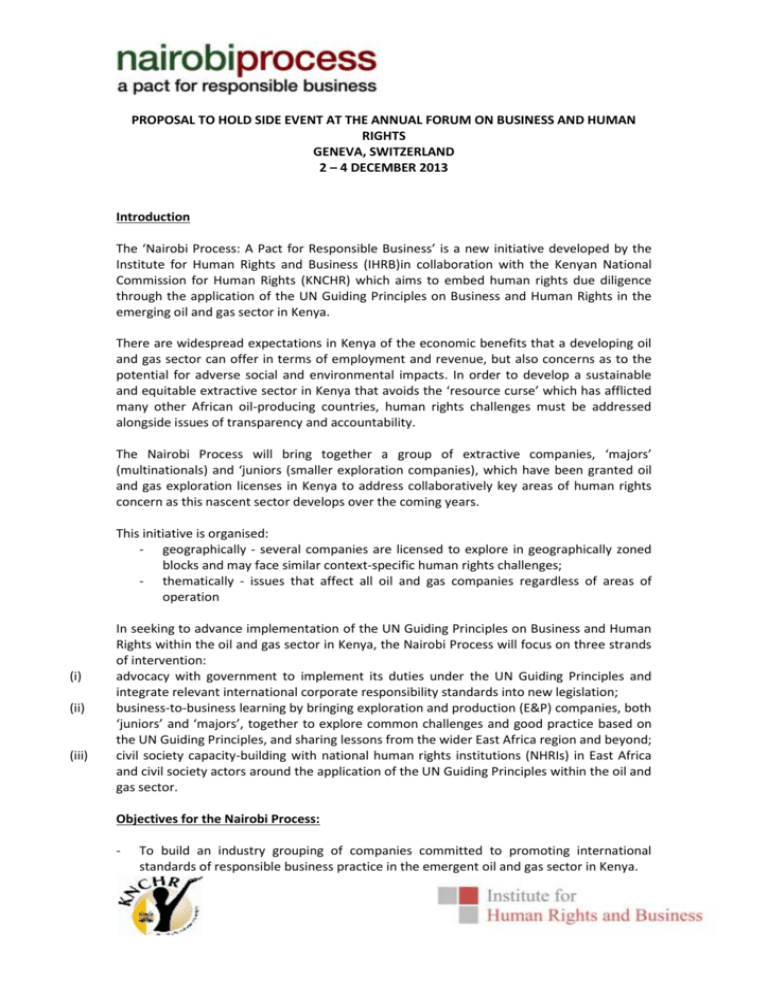
PROPOSAL TO HOLD SIDE EVENT AT THE ANNUAL FORUM ON BUSINESS AND HUMAN RIGHTS GENEVA, SWITZERLAND 2 – 4 DECEMBER 2013 Introduction The ‘Nairobi Process: A Pact for Responsible Business’ is a new initiative developed by the Institute for Human Rights and Business (IHRB)in collaboration with the Kenyan National Commission for Human Rights (KNCHR) which aims to embed human rights due diligence through the application of the UN Guiding Principles on Business and Human Rights in the emerging oil and gas sector in Kenya. There are widespread expectations in Kenya of the economic benefits that a developing oil and gas sector can offer in terms of employment and revenue, but also concerns as to the potential for adverse social and environmental impacts. In order to develop a sustainable and equitable extractive sector in Kenya that avoids the ‘resource curse’ which has afflicted many other African oil-producing countries, human rights challenges must be addressed alongside issues of transparency and accountability. The Nairobi Process will bring together a group of extractive companies, ‘majors’ (multinationals) and ‘juniors (smaller exploration companies), which have been granted oil and gas exploration licenses in Kenya to address collaboratively key areas of human rights concern as this nascent sector develops over the coming years. This initiative is organised: - geographically - several companies are licensed to explore in geographically zoned blocks and may face similar context-specific human rights challenges; - thematically - issues that affect all oil and gas companies regardless of areas of operation (i) (ii) (iii) In seeking to advance implementation of the UN Guiding Principles on Business and Human Rights within the oil and gas sector in Kenya, the Nairobi Process will focus on three strands of intervention: advocacy with government to implement its duties under the UN Guiding Principles and integrate relevant international corporate responsibility standards into new legislation; business-to-business learning by bringing exploration and production (E&P) companies, both ‘juniors’ and ‘majors’, together to explore common challenges and good practice based on the UN Guiding Principles, and sharing lessons from the wider East Africa region and beyond; civil society capacity-building with national human rights institutions (NHRIs) in East Africa and civil society actors around the application of the UN Guiding Principles within the oil and gas sector. Objectives for the Nairobi Process: - To build an industry grouping of companies committed to promoting international standards of responsible business practice in the emergent oil and gas sector in Kenya. - To develop with this group of companies and other key stakeholders a process of ongoing engagement around the UN Guiding Principleson Business and Human Rights as well as other relevant guidance such as the European Commission’s Oil and Gas sector guidance and IPIECA guidelines. - To create a confidential ‘dilemmas forum’ to allow companies to exchange ideas and lessons on tackling areas of potential human rights challenges arising from oil and gas sector activity in Kenya. To develop a sector wide impact assessment (SWIA) methodology to assist oil and gas companies to establish an informed framework for managing human rights risks in their exploration and production activities in Kenya. - A number of companies that hold licenses to explore oil and gas in Kenya have already signalled keen interest in being involved in the Nairobi Process, as have several civil society organisations and donor governments, following consultation meetings in 2012. The first business-to-business meeting of the Nairobi Process and inaugural meeting of its advisory group took place in May 2013 in Nairobi. In July 2013, IHRB and KNCHR held a series of meetings with business, governments and civil society in Kenya, Tanzania and Uganda on security and human rights and the relevance of the Voluntary Principles on Security and Human Rights (Voluntary Principles). Next Steps to Addressing the Issue of Security and Human Rights The need for collaborative dialogue to address the issue of security between relevant government agencies and oil and gas companies is imperative. To this end, the following action steps were proposed: i) ii) iii) iv) v) vi) vii) viii) ix) Organising a roundtable discussion to include the police (NSPC, IPOA, KPS) in order to identify and understand security risks, with a view to defining responsibilities for each set of actors (i.e. companies, state agencies). This will involve key security personnel from companies that are members of the Kenya Oil and Gas Association (KOGA). Creation of an inter-ministerial committee on internal security, which would ensure policy coherence. Nairobi –based embassies focusing on security and human rights as a priority area are committed to encouraging companies listed in their respective countries to sign the Voluntary Principles on Security and Human Rights. Discussion of the establishment of a specialized police unit for oil and gas. A joint risk assessment exercise for the police and oil and gas companies. Agreeing tools, developing processes, and making commitments to deal with grievance handling at company operation sites. Engaging in trust building exercises between relevant stakeholders. Drafting of MOUs where stakeholders commit to the process. Providing an input from the Nairobi Process to the Private Security Bill, which is currently under review and seeking an opportunity to align the Bill with the existing International Code of Conduct for Private Security Service Providers. The Swiss Embassy in Nairobi has given its commitment to host a meeting in October 2013 to collaboratively address security issues with a wider group of x) stakeholders including companies, senior Kenyan government officials, the police and civil society. Engaging the Nairobi Process Advisory Group to lead, manage and advise on issues and recommend further actions. Annual Forum on Business and Human Rights The KNCHR and IHRB would like to propose a side event at the United Nations (UN) Annual Business and Human Rights Forum which will be held from 2 – 4 December 2013 in Geneva, Switzerland. The main aim of this event is to showcase the Nairobi Process and initiate dialogue on whether this model can be replicated in other developing countries and across other sectors. The event will draw on relevant lessons for the emerging oil and gas sector in Kenya and from Colombia around the Guias Colombia and the Voluntary Principles on Security and Human Rights. About the Kenya National Commission on Human Rights The Commission is an independent National Human Rights Institution (NHRI) entrenched in the Constitution of Kenya (2010) under Article 59(4) and operationalized under the KNCHR Act No. 14 of 2011 to succeed the Kenya National Commission on Human Rights Act, 2002. The Commission’s mandate spelt out in the Constitution and in the KNCHR Act are among others to promote respect for human rights in public and private institutions: to monitor, investigate and report on observance of human rights and to act as the principal organ of the State in ensuring compliance with international and regional human rights obligations. For more information please see www.knchr.org About the Institute for Human Rights and Business (IHRB) IHRB is dedicated to being a global centre of excellence and expertise on the relationship between business and internationally proclaimed human rights standards. The Institute works to raise corporate standards and strengthen public policy to ensure that the activities of companies do not contribute to human rights abuses, and in fact lead to positive outcomes. We seek to address problems where the law may be unclear, where accountability and responsibility may not be well-defined, and where legitimate dispute settlement mechanisms may be non-existent or poorly-administered. For more information please see: http://www.ihrb.org/about/programmes/nairobiprocess.html
